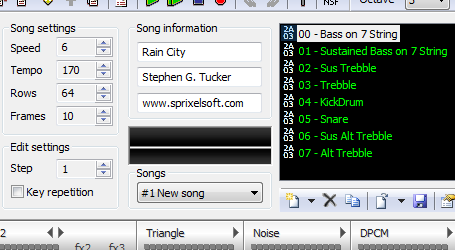Rain City Chiptune
We began developing our second arena, Rain City a while ago. Basically, it’s our version of beloved Vancouver: complete with rain, neon lights, and burning cop cars. It’ll be a while yet before you see any finished background art for that part of the game, but I do have a special treat for you this time around.
I’ve decided that I’m not 100% sold on confining our sound track to the standard capabilities of the NES. In past tracks, I tried limiting myself to the basic module in Famitracker: two square channels, one triangle channel, and one noise channel. I’ve been pretty lazy with incorporating DMC samples (low quality sound recordings that aren’t computer driven). This time around though, having played with it a bit in the past, I decided to try pushing the envelope a bit and went with the Nintendo MMC5 module. This means I get access to a couple of extra square channels.
When not just singing into a microphone, I like to jam out melodies and rhythms on the guitar when coming up with tunes. This time around instead of using the triangle channel for the bass, I decided to use one of the squares. Conveniently, the lowest note that can be achieved with the square channels happens to be the same low B that my seven string guitar is tuned to. I guess that gives me a little bit of confidence when jamming as I know the range of notes is replicable.
Since I ended up using a square as a bass, that freed the triangle up for me to try getting a little more complexity into the drums. I turned it into a kick drum for this track. while using the noise channel for more of a snare sound. That left me the other three squares for melody and harmony which, made it a little more pleasant to work with. There’s a good chance I’ll revisit the Title theme and the Oil Sands theme with a MMC5 treatment to get a little more depth in the tunes.
I also haven’t had to use triplets in Famitracker until this track, so it was interesting figuring out how to make that happen. Since you don’t get the luxury of writing sheet music into the program, it meant that I had to play with note delays instead so that notes were not triggered at the precise time that they would normally. Fun!
Anyways, here’s the track. Enjoy!




































